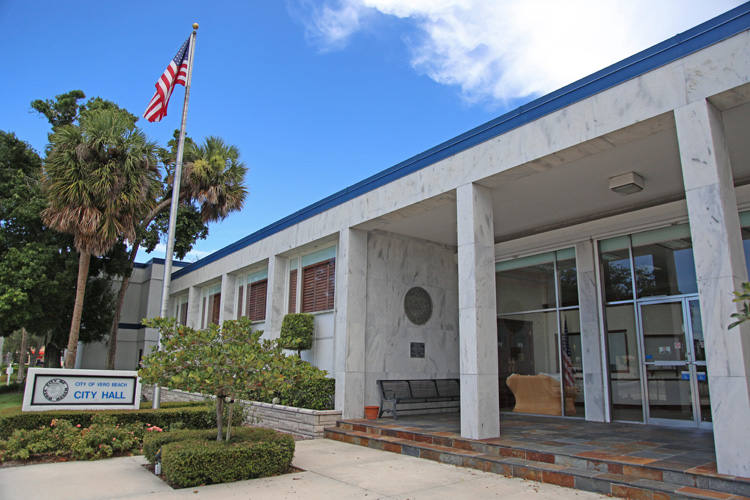When Indian River Shores Mayor Brian Foley and Vero Beach Mayor Robbie Brackett met on Dec. 21 to discuss a pending federal antitrust lawsuit about Vero’s water-sewer territory, Brackett told Vero Beach 32963 he wanted to resolve this matter between the neighbors rapidly.
Two months later, Vero appears to want to slow-walk the case.
“One thing we agreed upon was to move as quickly as possible. They want to move the process along and so do we,” Brackett said back then, adding that Vero needs an answer to the questions about its service territory as soon as possible because the city is designing a new wastewater treatment plant, which sources say could cost $60 million to $80 million or more.
Indian River Shores says Vero’s claim to a perpetual water-sewer service territory is illegal, and the town’s legal team is on track to try the case in December. But Vero’s lawyers say they have a solid defense that will make for a winning case. Vero wants the trial set for Sept. 25, 2023, just days before the Shores must put Vero on notice as to whether or not the town will renew its October 2012 franchise agreement.
Vero and Indian River Shores filed a “Joint Proposed Scheduling Order” in U.S. District Court for the Southern District of Florida last Friday, reporting to the judge that the parties disagree on how the case should proceed, and even on who the parties should be.
“Both the Town and the City repeatedly acknowledged the importance of having this case resolved as promptly as possible. In particular, the City has stated on numerous occasions that it needs to know whether the Town will be a customer of essential wastewater services so that the City can adequately plan the construction of a new wastewater facility,” the Shores’ lawyers wrote to the federal court.
“The current Franchise Agreement between the Town and the City provides that the Town must provide notice to terminate or renegotiate by October 1, 2023. As such, the Town needs to have a clear understanding of its alternative supply services by that time.”
Vero’s lawyers countered, “There is no reason for an expedited track as the Town seeks solely an ‘advisory’ opinion by this court. It is important to the City to obtain a result in this action, as the City acknowledges its timeline to construct a new water reclamation facility and move the old one off the river in five years. However, this action is not for a breach of the franchise agreement between the parties, it is regarding the 1989 Agreement and relates to whether Indian River County must first obtain the City’s consent to serve the Town.
“The Agreement does not prohibit the Town from serving itself, nor from obtaining utility services from a private provider or another governmental agency/municipality. The City does not require an expedited answer to proceed with design of the new water reclamation facility and proceed with its construction and believes that the expedited Track for this litigation is not a necessity,” the city argued.
It seems Vero’s legal team is now at cross purposes with the popular mayor who has his sights on representing Indian River County in the Florida House of Representatives. Unless he loses the Republican primary for the House seat on Aug. 23, Brackett likely won’t be on the City Council after November when the case comes to trial.
The Shores wants the matter placed in Expedited Case Management because, as Brackett said, both parties want a quick resolution, but Vero told the court the city wants the case to plod along in Standard Case Management, but for the court to entertain Vero’s motion to dismiss, which could end the whole ordeal rather quickly if Vero prevails.
If the case goes forward, Vero wants Indian River County to be tossed into the mix as a party, further complicating the lawsuit – despite the county’s protestations that the legal dispute is clearly between the Shores and Vero only.
Indian River County and Vero were the two parties who signed the 1989 territorial agreement that the Shores is challenging on the grounds that it violates federal antitrust law. Indian River Shores was not a party to the agreement which carved out water-sewer utility territories, placing the town in Vero’s territory.
Vero says the town consented at the time, and that Vero’s water and sewer service facilitated the development that’s filled the town and county coffers with property tax dollars for decades.
Vero’s slow-walking of the case could amount to a multimillion-dollar game of chicken for Mayor Brian Foley and the Indian River Shores Town Council if the court does not see fit to provide the taxpayers of both Vero and the Shores a clear answer sooner than later.

